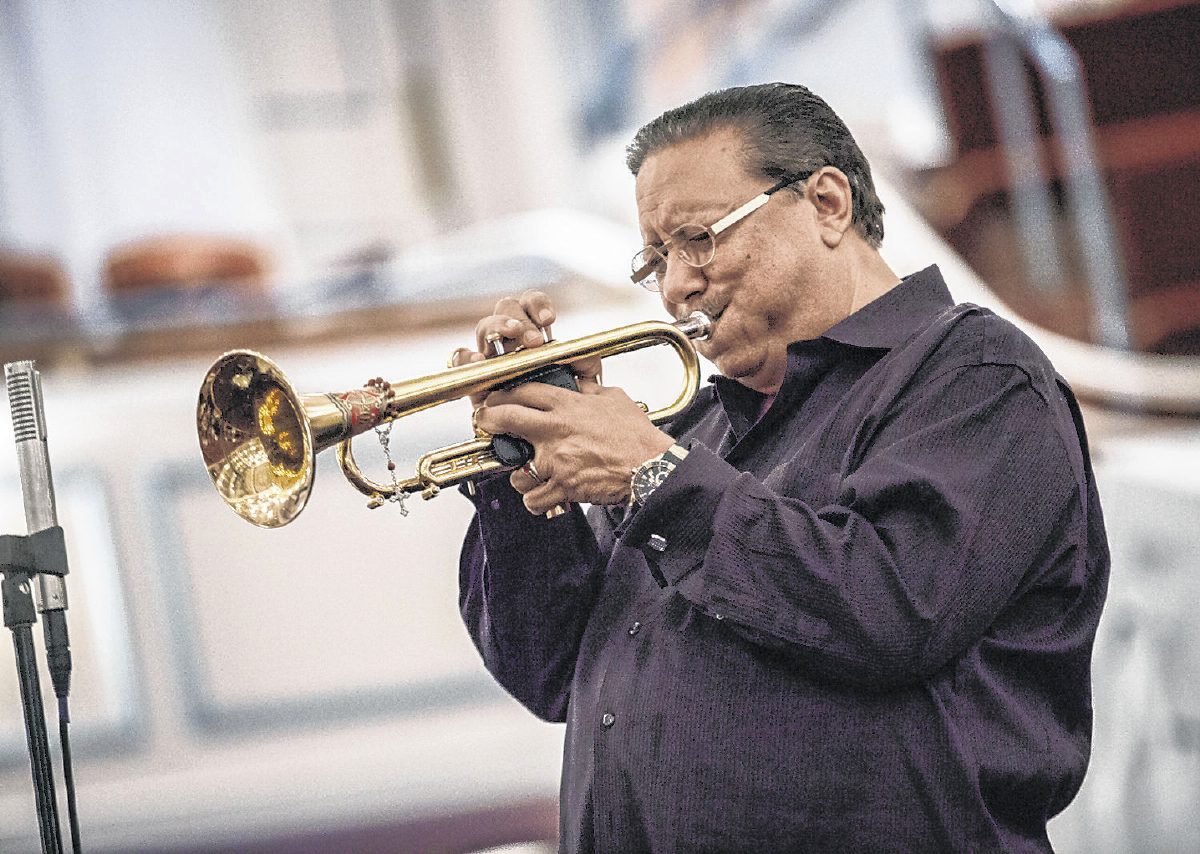The passionate, fiery blend of horns and rhythm was unlike anything he’d ever heard.
Arturo Sandoval knew the trumpet. The precocious musician had been classically trained in the instrument starting at age 12 in his native Cuba. But when a friend put on a record of jazz masters Dizzy Gillespie and Charlie Parker, Sandoval’s entire perspective opened up.
“That turned my head upside down. I wanted to learn what that is. I wanted to learn what that is,” he said. “After so many years, 40 or 50 years, I’m still on a mission to find it out.”
[sc:text-divider text-divider-title=”Story continues below gallery” ]
Sandoval went on to become one of the most accomplished trumpeters in the world, becoming a protege of Gillespie, winning 10 Grammy Awards and capturing the attention of millions of music fans. He has performed at the Super Bowl with Tony Bennett and Patti LaBelle, and played the Boston Pops with conductor John Williams.
He defected from Cuba in 1990 while on tour with Gillespie and eventually became an U.S. citizen. In 2013, he was awarded the Presidential Medal of Freedom, the highest honor a civilian can earn in the U.S.
And still, despite all of the accomplishments, his greatest passion is still just the music.
“Being on the stage is a joy. Every time we have the opportunity to be in front of an audience and you see the response from the people, it’s an indescribable emotion,” he said.
Sandoval will be performing in Indianapolis on Sept. 19 as part of the Indy Jazz Fest, a 10-day extravaganza of music taking place throughout central Indiana. In advance of his appearance, he took some time to talk about his career, the draw of jazz and his love for performing.
What drew you towards the trumpet in the first place?
“There was something about the sound of the horns that inspired me and want to discover to make the horn sound. I strongly believe the trumpet, it really gives you all kind of possibility how to spread your feelings without limitation. The horn can whisper, but also can make a big noise. You feel like you can express your feeling all the way through.”
Once you had playing for a while, how did you start playing jazz?
“I’d never heard any jazz up to that point. Then someone in Cuba talked to me and asked if I was familiar with jazz music. I said, ‘What is that?’ and they said, ‘Come with me.’ They played a vinyl of Dizzie Gillespie and Charlie Parker — it was a compilation of recordings from the ‘40s. That was it.”
What is like playing jazz for about 50 years?
“It’s a learning process always. The day you believe you know something, oh, so sorry. It’s much better to be open-minded and be sure that you learn and improve and grow any moment in your career. It’s something that’s a work in progress forever.”
How have you drawn from different sounds and different styles of music to create your sound?
“I believe the brain is like a hard drive. You have a bunch of memories there, then you have a different way you can plug in and out depending on the necessity of what the music asks you. This is the idea that it’s always a possibility that we have to learn to switch back and forth.”
How did you come to work with Dizzy Gillespie?
“We met in Cuba in May 1977. He was there on a jazz cruise, and they stopped there for a couple days. We played together, we met and from there on, I was so blessed. We became so close, and I started playing with him right away up until the time he passed away. He helped me over the years so much; I have no words to describe my gratitude and appreciation for what he did for me, besides the inspiration, which is immense.”
Looking back at your career, are there things that you’ve done or people you’ve played with you still can’t believe happened?
“It’s like a big dream. I’m on a cloud floating in the sky. Everything that’s happened to me over the years, I’m so blessed. I grew up in the middle of the countryside on the island in small village. I quit school when I was in fifth grade. My family was extremely poor; we didn’t even have a floor in the house, we had dirt. From there, to nowadays and I look back at all of the things I’ve been doing for so many years, it’s a blessing from God.”
What was it like for you to be awarded the Presidential Medal of Freedom?
“It’s such a privilege and such an honor. I really keep that close to my heart, immense appreciation and respect. Nobody loves this country more than me. Equally? Maybe. More? Forget it. Impossible. I know the difference between freedom and lack of freedom. I know that. I suffered that.”
What can people expect if they’ve never seen you perform?
“It’s up to them. We’re going to put the same enthusiasm and same heart into what we do. It’s no different from any other gig we’ve been doing over the years. We go to the stage with 100 percent body and soul in the mission. If people respond to that, and that connection gets established properly, we are the happiest people on earth.”
[sc:pullout-title pullout-title=”If you go” ][sc:pullout-text-begin]
Arturo Sandoval
When: 7:30 p.m. Sept. 19
Where: Schrott Center for the Arts, Butler University, 610 W. 46th St., Indianapolis
Tickets and full Indy Jazz Fest schedule: indyjazzfest.net
[sc:pullout-text-end]





